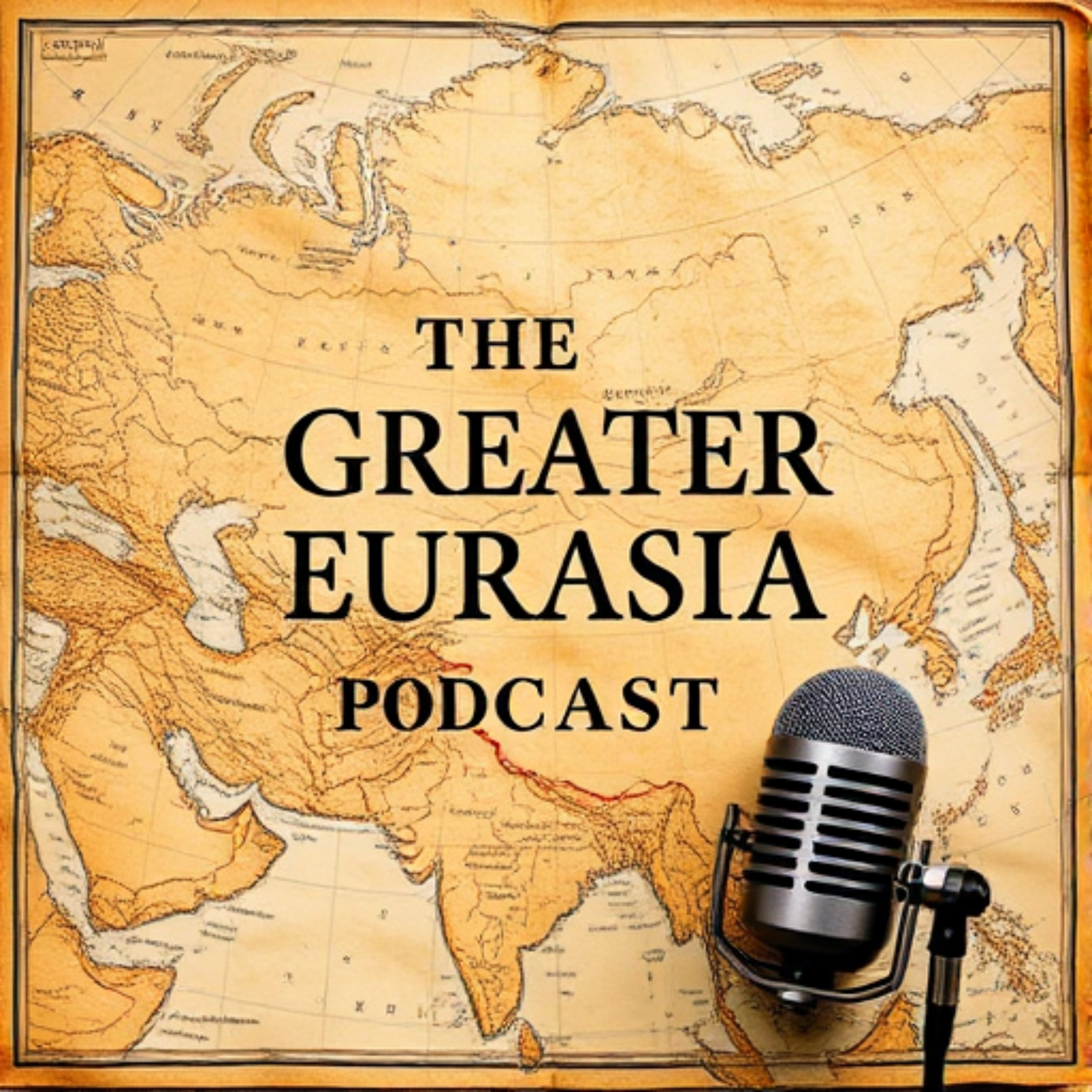

Glenn Diesen - Greater Eurasia Podcast
Glenn Diesen
Russian foreign policy, Geoeconomics & Eurasian integration
Books by Professor Diesen: https://www.amazon.com/stores/author/B09FPQ4MDL
Books by Professor Diesen: https://www.amazon.com/stores/author/B09FPQ4MDL
Episodes
Mentioned books

May 10, 2025 • 20min
Dmitry Polyanskiy: Victory Day & Politics of Historical Revisionism
Dmitry Polyanskiy is the First Deputy Permanent Representative of the Russian Federation to the United Nations. Polyanskiy outlines why Russia believes the West is engaging in historical revisionism of the Second World War. Russia is blamed for starting the war, and is also gradually being edited out of the victory. Follow Prof. Glenn Diesen: Substack: https://glenndiesen.substack.com/ X/Twitter: https://x.com/Glenn_DiesenPatreon: https://www.patreon.com/glenndiesen Support the channel: PayPal: https://www.paypal.com/paypalme/glenndiesen Buy me a Coffee: buymeacoffee.com/gdieseng Go Fund Me: https://gofund.me/09ea012f

May 10, 2025 • 31min
Gerald Celente: Endless Wars are Now Breaking the US Economy
The renowned trend forecaster Gerald Celente joins the program to discuss how America's wars are contributing to bring down the economy.Subscribe to the Trends Journal and use the promo code "GLENN" to get a 10% discount: https://trendsjournal.com/subscribe/Follow Prof. Glenn Diesen:Substack: https://glenndiesen.substack.com/X/Twitter: https://x.com/Glenn_DiesenPatreon: https://www.patreon.com/glenndiesenSupport the channel:PayPal: https://www.paypal.com/paypalme/glenndiesenBuy me a Coffee: buymeacoffee.com/gdiesengGo Fund Me: https://gofund.me/09ea012f

May 9, 2025 • 42min
Col. Douglas Macgregor: Victory Day - Russia Already Won the War
Colonel Douglas Macgregor on Victory Day and the consequences of NATO losing the proxy war in UkraineFollow Prof. Glenn Diesen:Substack: https://glenndiesen.substack.com/X/Twitter: https://x.com/Glenn_DiesenPatreon: https://www.patreon.com/glenndiesenSupport the channel:PayPal: https://www.paypal.com/paypalme/glenndiesenBuy me a Coffee: buymeacoffee.com/gdiesengGo Fund Me: https://gofund.me/09ea012f

May 7, 2025 • 1h 2min
Marta Havryshko: How Radical Nationalists Hijacked Ukraine
Dr. Marta Havryshko is a visiting assistant professor of Holocaust and Genocide Studies. Havryshko also specialises in the role of radical nationalists in Ukraine, a small minority who have gained immense power.Follow Prof. Glenn Diesen:Substack: https://glenndiesen.substack.com/X/Twitter: https://x.com/Glenn_DiesenPatreon: https://www.patreon.com/glenndiesenSupport the channel:PayPal: https://www.paypal.com/paypalme/glenndiesenBuy me a Coffee: buymeacoffee.com/gdiesengGo Fund Me: https://gofund.me/09ea012f

May 4, 2025 • 56min
Michael Rossi: Perils of the West's Moral Righteousness
Dr. Michael Rossi outlines the dangers of viewing international politics through the prism of morality, as the world is dividing into a simplistic struggle of good versus evil. The predictable consequence is that adversaries are not believed to respond to security concerns, diplomacy and negotiations become criminalised, and containment or war are the only paths to peace.Follow Prof. Glenn Diesen:Substack: https://glenndiesen.substack.com/X/Twitter: https://x.com/Glenn_DiesenPatreon: https://www.patreon.com/glenndiesenSupport the channel:PayPal: https://www.paypal.com/paypalme/glenndiesenBuy me a Coffee: buymeacoffee.com/gdiesengGo Fund Me: https://gofund.me/09ea012f

May 2, 2025 • 46min
Jurij Kofner: Germany Designates Its Main Opposition Party as an "Extremist Organisation"
Jurij Kofner is an economist and an economic advisor to AfD. After AfD polled as the largest political party in Germany, the German authorities designated it a “right-wing extremist organisation”, which could be the first step to banning the opposition.Follow Prof. Glenn Diesen:Substack: https://glenndiesen.substack.com/X/Twitter: https://x.com/Glenn_DiesenPatreon: https://www.patreon.com/glenndiesenSupport the channel:PayPal: https://www.paypal.com/paypalme/glenndiesenBuy me a Coffee: buymeacoffee.com/gdiesengGo Fund Me: https://gofund.me/09ea012f

May 2, 2025 • 22min
Jeffrey Sachs: Chinese Statecraft & a New World Order
Prof. Jeffrey Sachs is a world-renowned economics professor, a bestselling author, an innovative educator, and a global leader in sustainable development. Prof. Sachs discusses the wider historical meaning of the current economic war between the US and China, which represents the end of centuries of a Western-centric world. Prof. Sachs also discusses how and why the Western geopolitical mindset is distinctively different from that of China.Follow Prof. Glenn Diesen:Substack: https://glenndiesen.substack.com/X/Twitter: https://x.com/Glenn_DiesenPatreon: https://www.patreon.com/glenndiesenSupport the channel:PayPal: https://www.paypal.com/paypalme/glenndiesenBuy me a Coffee: buymeacoffee.com/gdiesengGo Fund Me: https://gofund.me/09ea012f

May 1, 2025 • 39min
Scott Ritter: Ukraine Negotiations Failed
Scott Ritter is a former intelligence officer in the US Marine Corps & a former UN Weapons Inspector. Ritter outlines why the negotiations to end the Ukraine War will fail.Follow Prof. Glenn Diesen:Substack: https://glenndiesen.substack.com/X/Twitter: https://x.com/Glenn_DiesenPatreon: https://www.patreon.com/glenndiesenSupport the channel: PayPal: https://www.paypal.com/paypalme/glenndiesenBuy me a Coffee: buymeacoffee.com/gdiesengGo Fund Me: https://gofund.me/09ea012f

Apr 30, 2025 • 56min
Einar Tangen: Geopolitical Consequences of the US-China Economic War
Einar Tangen is a Senior Fellow at the Taihe Institute and the Chairman of Asia Narratives. Tangen outlines how the economic coercion by the US has compelled China to pursue greater self-sufficiency and to create an international economic architecture that is less vulnerable to dependence on the US. Follow Prof. Glenn Diesen:Substack: https://glenndiesen.substack.com/X/Twitter: https://x.com/Glenn_DiesenPatreon: https://www.patreon.com/glenndiesenSupport the channel:PayPal: https://www.paypal.com/paypalme/glenndiesenBuy me a Coffee: buymeacoffee.com/gdiesengGo Fund Me: https://gofund.me/09ea012f

Apr 30, 2025 • 49min
Patrik Baab: German War Propaganda in the Ukraine War
Patrik Baab is a German journalist and best-selling author who reported on both sides of the frontline in Ukraine, and concluded that the NATO war propaganda had overwhelmed German society. Follow Prof. Glenn Diesen: Substack: https://glenndiesen.substack.com/ X/Twitter: https://x.com/Glenn_DiesenPatreon: https://www.patreon.com/glenndiesen Support the channel: PayPal: https://www.paypal.com/paypalme/glenndiesen Buy me a Coffee: buymeacoffee.com/gdieseng Go Fund Me: https://gofund.me/09ea012f


